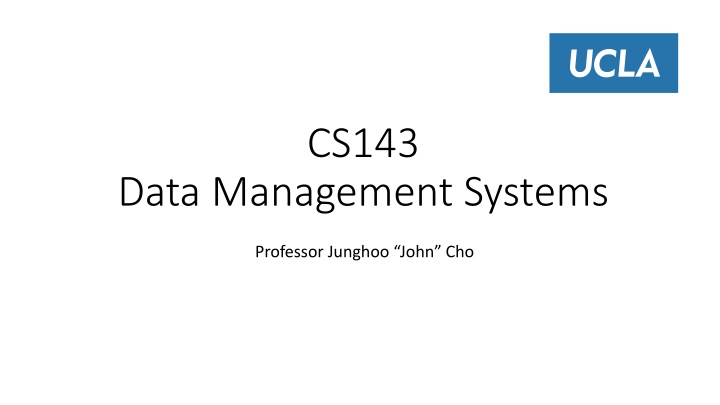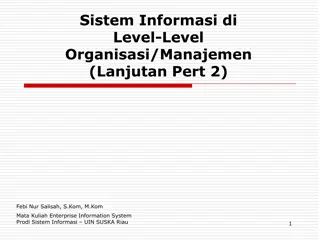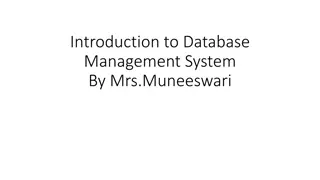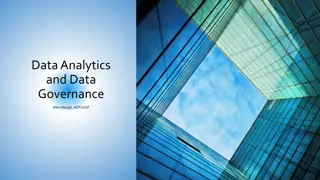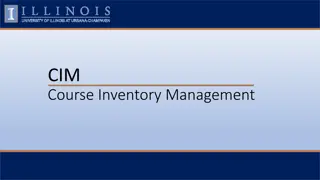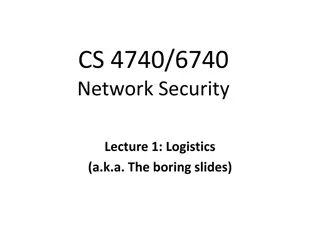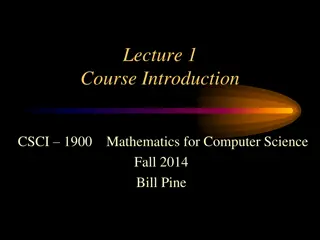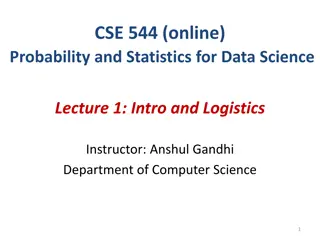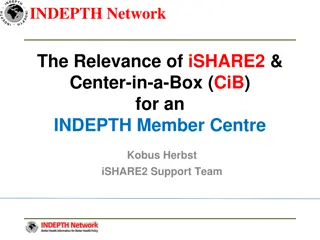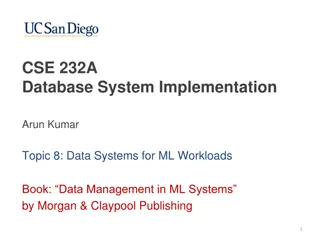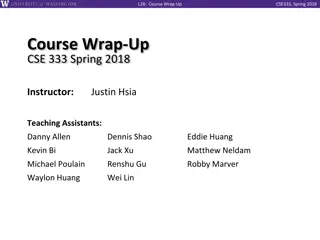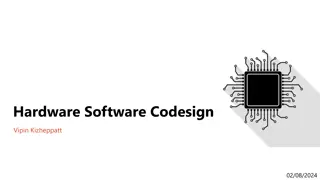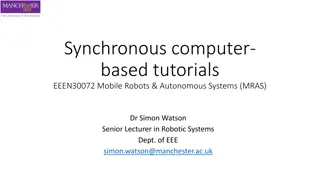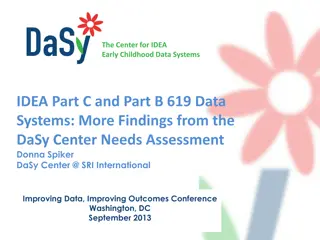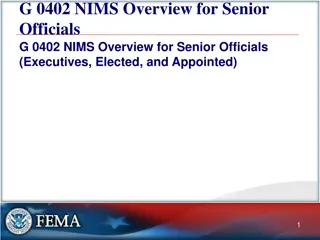Introduction to CS143 Data Management Systems Course
This course, taught by Professor Junghoo John Cho, covers topics such as data management systems, SQL, RDBMS, and NoSQL databases. Students will learn to store data, interact with databases using SQL, and understand the workings of DBMS. The course objectives, structure, staff information, lecture format, PTE issuance status, and grading criteria are outlined. Additionally, tentative course topics, recommended textbook, and quiz details are provided.
Download Presentation

Please find below an Image/Link to download the presentation.
The content on the website is provided AS IS for your information and personal use only. It may not be sold, licensed, or shared on other websites without obtaining consent from the author.If you encounter any issues during the download, it is possible that the publisher has removed the file from their server.
You are allowed to download the files provided on this website for personal or commercial use, subject to the condition that they are used lawfully. All files are the property of their respective owners.
The content on the website is provided AS IS for your information and personal use only. It may not be sold, licensed, or shared on other websites without obtaining consent from the author.
E N D
Presentation Transcript
CS143 Data Management Systems Professor Junghoo John Cho
Course Staff Instructor: Junghoo John Cho Email: cho@cs.ucla.edu Office: Boelter Hall 3531H Research area: natural language processing, machine learning, search engine TA Vivian Cheng (viviancheng1993@gmail.com) Tyler Davis (tylerdavis@g.ucla.edu) Song Jiang (songjiang@cs.ucla.edu) Jason Teoh (jteoh@cs.ucla.edu) Ariel Wu (wuyue0715@ucla.edu) 2
Lecture Q&A Ask questions via sli.do during class #808652 https://app.sli.do/event/otspn2lm Questions with 3 or more likes are answered in class Other questions are answered after the class 3
PTE All CS students who submitted ECR have been added No more PTEs will be issued We are way over capacity 4
Introduction Course objective Course administration What is a database system? 5
Course Objective Learn how to use data management systems Learn data model Learn SQL (Structured Query Language) Learn Relational Database Management Systems (RDBMS) Learn basics of other non-relational DBMS (NoSQL) By the end of the quarter you will know How to store data in DBMS How to retrieve and interact with data in RDBMS using SQL In particular, you learn how to use MySQL How DBMS works 6
Tentative Course Topics Relational model Relational algebra SQL Entity-relationship model Relational design theory Key data structure and algorithms for DBMS Query execution Transactions NoSQL Database Non-relational data processing 7
Textbook Database System Concepts by Silberschatz, Korth, and Sudarshan 5th or later editions are OK 8
Grading Homework 10% Project 40% Quiz 50% 9
Quiz At the following hours 10/30 (5th week Saturday) 10-11:59 AM 12/04 (10th week Saturday) 10-11:59 AM Closed-book and closed notes Cheat-sheet allowed Calculator allowed If you cannot be physically present Submit your reason and timezone info via Google Form https://forms.gle/DskLuqYf6eEYKgn49 I am attending the class remotely from South Korea Saturday 10-11:50AM is Sunday 2-3:50AM in Seoul, Korea (GMT+9) 10
Homework Review of what is learned in the lectures Checked by completion, not by correctness You will get full credit as long as you submit your work and demonstrate reasonable efforts Tentative schedule (due on Wednesdays) Week 2: Relational algebra Week 3: SQL Week 5: ER Week 6: Normalization and integrity Week 8: Disk Week 9: Index More on Join, transaction 11
Project Manage real-world data using data management/processing tools 4 grace days to accommodate emergency Maximum 2 days late per project 5N% penalty once grace days are used up Tentative schedule (due on Sundays) Week 2: System setup and MySQL bulk load Week 4: Simple movie Web site Week 6: Load Nobel Prize JSON Data to MySQL Week 7: Load Nobel Prize JSON Data to MongoDB Week 8: Frequent Book Pair on Spark Week 9: Google n-gram processing using Unix text tools 12
Lectures and Discussion Sections Lectures Monday, Wednesday: 10 11:50AM https://ucla.zoom.us/j/96835293526 Meeting ID: 968 3529 3526, Passcode: 154806 Three discussion sections (one in-person and two online) Online: https://ucla.zoom.us/j/95871805961 (Passcode 557333) Friday 10AM: Lecture and homework discussion Friday 12PM: Project discussion In-Person: Bunche 2209A Friday 12-2PM: General Q&A Lectures and online discussion sections will be recorded 13
Office Hours Zoom link https://ucla.zoom.us/j/92515789392 Meeting ID: 925 1578 9392, Passcode: 101707 Hours Monday 12-2PM (Vivian) Tuesday 12-2PM (Ariel) Wednesday 9-10AM (Jason), 2-3PM (John), 3-4PM (Jason) Thursday 9-10AM, 3-4PM (Tyler) Friday 4-6PM (Song) Office hours will not be recorded 14
Other Communication Class videos will be available on CCLE https://ccle.ucla.edu/course/view/21F-COMSCI143-1 Other course materials are available on our Web site http://oak.cs.ucla.edu/classes/cs143/ Campuswire will be used for online discussion and general question https://campuswire.com/c/G17AAD1D2 Assignment submission via Gradescope https://www.gradescope.com/courses/316671 15
Database Management System (DBMS) Q: What is a DBMS? A: A system that manages massive amounts of data and provides convenient, efficient, persistent, and safe access to such data to many users simultaneously Massive Convenient Efficient Persistent Safe Many users 16
Database Architecture Command Line Interface APP API DBMS engine OS Disk 17
Popular DBMS Software Relational Open source: MySQL, PostgreSQL, Closed source: Oracle, Microsoft SQL Server, IBM DB2, Non-relational (NoSQL) MongoDB Spark Cloud Amazon RDS, Azure SQL Database, Google Cloud Spanner, Oracle Database Cloud, 18
Database is Everywhere All businesses manage various types of data Online banking Amazon, Walmart, Phone backend system SQL is the language to interact with business-related data Primary focus of this class 19
MySQL, Docker, Unix In our class, students are required to learn and use Docker (on Windows or Mac) Unix command line MariaDB ( MySQL) Why? MySQL is most popular open-source RDBMS Docker is easiest way to install, manage, and use software packages Unix command line provides expressive power to deal with files and data They are difficult to learn initially, but it will pay off enormously 20
Announcements Make sure to be on Campuswire and Gradescope Campuswire: https://campuswire.com/p/G17AAD1D2/ (code: 1767) Gradescope: Send email to TA Start Project 1 http://oak.cs.ucla.edu/classes/cs143/project1/ Get familiar with Docker and Unix command line MySQL Bulk-load command will be learned in next lecture Learn PHP (for Project 2) and Python (for Projects 3-5) 21
